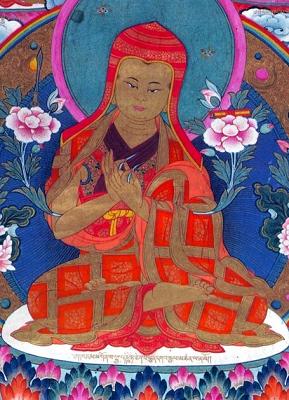Sakya Pandita Kunga Gyaltsen: Difference between revisions
Jump to navigation
Jump to search
No edit summary |
|||
| Line 17: | Line 17: | ||
==Internal Links== | ==Internal Links== | ||
*[[Prayer to Sakya Pandita]] | *[[Prayer to Sakya Pandita]] | ||
*[[Throneholders of the Sakya school]] | |||
==External Links== | ==External Links== | ||
Revision as of 08:58, 19 November 2010

Sakya Pandita Kunga Gyaltsen (Wyl. sa skya paN+Di ta kun dga' rgyal mtshan) (1182-1251) — one of the five Sakya patriarchs and the nephew of Jetsün Drakpa Gyaltsen. He was one of the greatest scholars in Tibetan history and one of the so-called 'Three Mañjughoshas of Tibet'. He was the uncle of Chögyal Pakpa.
Writings
- Clear Differentiation of the Three Sets of Vows (sdom gsum rab dbye)
- Elucidating the Sage's Intent (thub pa dgongs pa rab gsal)
- Sakya Lekshé (sa skya legs bshad)
- Sapan Khenjuk (mkhas 'jug)
- Treasury of Valid Reasoning (tshad ma rigs pa'i gter)
Further Reading
- David P. Jackson, 'Commentaries on the Writings of Sa skya Pandita: A Bibliographical Sketch' in The Tibet Journal, Vol.VIII, No.3, Autumn 1983
- Migmar Tsering, 'Sakya Pandita: Glimpses of His Three Major Works' in The Tibet Journal, VOL.XIII,1, Spring 1988
- Sakya Pandita, Ordinary Wisdom: Sakya Pandita's Treasury of Good Advice, translated by John T. Davenport, Boston: Wisdom, 2000
- Sakya Pandita Kunga Gyaltsen, A Clear Differentiation of the Three Codes: Essential Distinctions among the Individual Liberation, Great Vehicle, and Tantric Systems, translated by Jared Rhoton, New York: SUNY, 2002